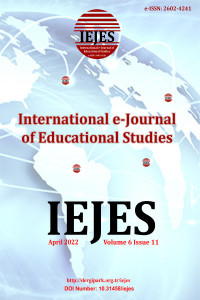The Impact of the Homework in Mathematics on Learning Style of Arab Primary School Students in Israel
Homework in mathematics, learning style, primary school
The Impact of the Homework in Mathematics on Learning Style of Arab Primary School Students in Israel
Homework in mathematics, learning style, primary school,
___
- Algani, Y. (2019). Innovative ways to weach wathematics: Are they employed in schools?, Journal of Computer and Education Research (JCER), 7(14), 496-514.
- Algani̇, Y. & Eshan, J. (2020). The effectiveness of a program for developing the skills of mathematical thinking for first year preparatory pupils. Journal of Gifted Education and Creativity, 7(2), 41-51.
- Astleitner, H. (2007). Theory: Designing task-based learning sequences. A categorical model of task attributes. In H. Astleit-ner&H.-J. Herber (Eds.), Task- and standard-based learning: An instructional psychology perspective. Frankfurt am Main, Germany: Lang. 9-34.
- Burriss, G., Kathleen, D. & Snead. (2017). Middle school students’ perceptions regarding the motivation and effectiveness of Homework. School Community Journal, 27(2).
- Cooper. (2006). Does homework improve academic achievement? A synthesis of research, 1987-2003. Review of Educational Research, 76(1), 1–62.
- Gecer A., & Dag F. (2012). A blended learning experience. Theory and Practice, 12(1), 438–442.
- Hong, E. Mason, Y. & Peng, N. Lee. (2015). Effects of homework motivation and worry anxiety on homework achievement in mathematics and english. Educational Research and Evaluation, 21(7), 491-514.
- Walk, L. & Lassak, M. (2017). Making homework matter to students. Mathematics Teaching in the Middle School, 22(9), 546-553.
- Kathleen, G. & Burris. (2016). Middle school teachers' perceptions regarding the motivation and effectiveness of homework. Journal of Inquiry and Action in Education, 7(2), 62-80.
- Kitsantas, A., Cheema, J., & Ware, W. (2011). Mathematics achievement: The role of homework and self-efficacy beliefs. Journal of Advanced Academics, 22 (2), 310-339.
- Misslis, O. (2009). The hidden values of homework culture. From a lecture he checked homework for homework. Israel.
- Novak, B., Francis, J., & Lynott. (2015). Homework in physical education: Benefits and implementation. A Journal for Physical and Sport Educators, 28(1), 22-26.
- Ruben-Fernandez-Alonso. (2015). Adolescents’ homework performance in mathematics and science: personal factors and teaching practices. Journal of Educational Psychology, Advance online publication.
- Sharp, W. Keys, P., & Benefield. (2007). Recent research on homework: an annotated bibliography. Upton Park, Slough, Berkshire: National Foundation for Educational Research.
- Shima, M., Farzad, R., & Hasan, A. (2012). The role of mathematical homework and prior knowledge on the relationship between students' mathematical performance, cognitive style and working memory capacity. Electronic Journal of Research in Educational Psychology, 10 (3), 1223-1248.
- Trautwein, O. & Lüdtke, O. (2009). Predicting homework motivation and homework effort in six school subjects: The role of person and family characteristics, classroom factors, and school track. Learning and Instruction, 19, 243–258.
- Tas, Y., Sungur-Vural, S. & Öztekin, C. (2014). A study of science teachers’ homework practices. Research in Education, 91, 45-64.
- Xu, J., Fan, X., & Du, J. (2017). Homework emotion regulation scale: confirming the factor structure with high school students. Journal of Psychoeducational Assessment, 35 (4), 437-441.
- Zare, R. N., Cox, C. T., Murphy, K., & Bayas, C. (2017). Implementation of peer-reviewed homework assignments. Journal of College Science Teaching, 46 (3), 40-46.
- Başlangıç: 2017
- Yayıncı: Tamer KUTLUCA
Çiğdem Gamze ÖZKAN, Yeter KURT, Aysun BAYRAM
The Role of Portfolio Assessment and Quizzes on Class Attendance and Language Achievement
Yousef M. ABD ALGANİ, Younis Fareed Abu ALHAIJA
Dewı Putrı PERTIWI, Zamzani ZAMZANI
Character and Values for World Citizenship: The Case of Social Studies Prospective Teachers
